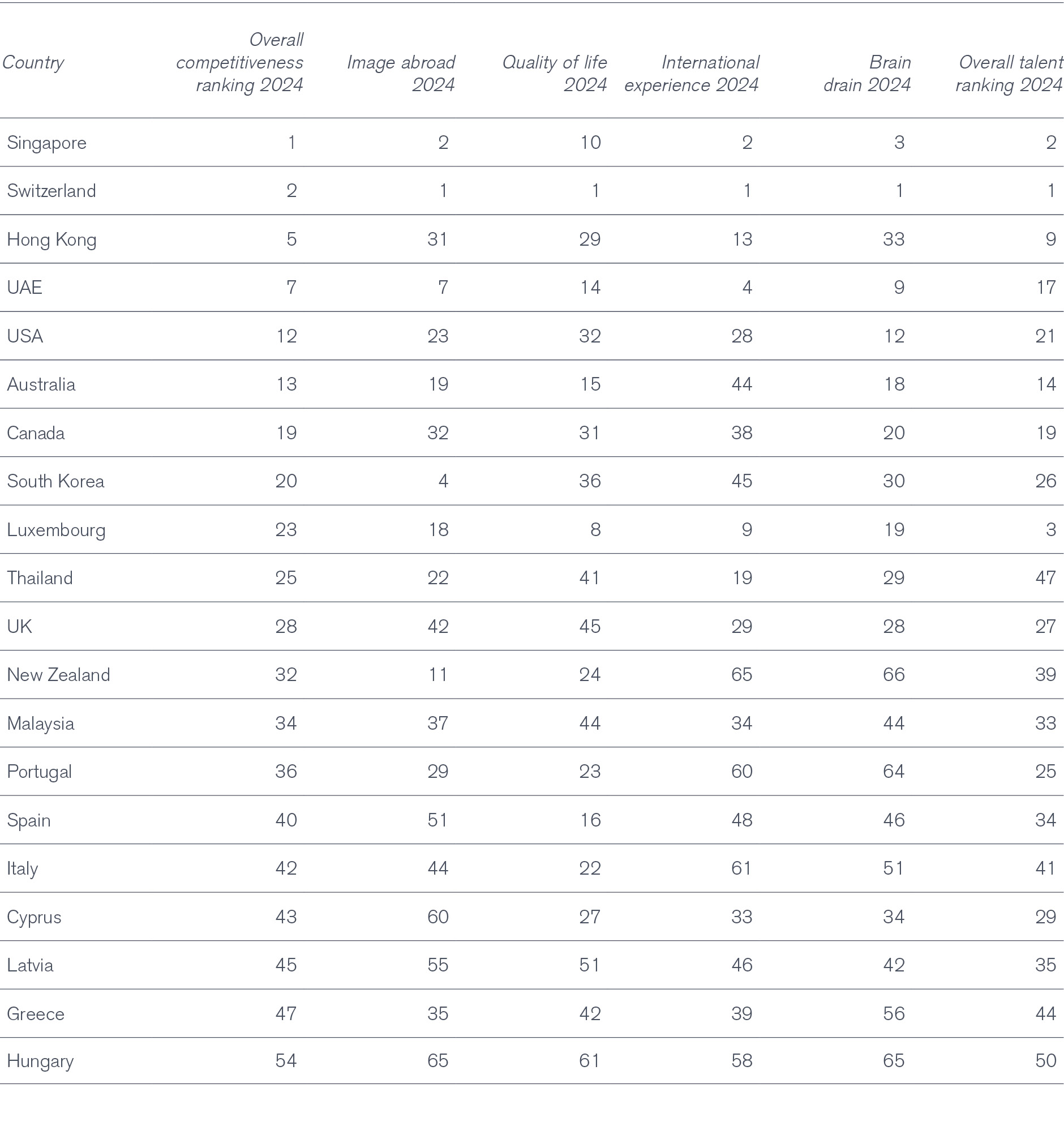Dr. José Caballero is a Senior Economist at the IMD World Competitiveness Center in Lausanne, Switzerland.
The IMD World Competitiveness Ranking,1 produced by the IMD World Competitiveness Center, measures how well countries manage their overall resources to enhance their creation of long-term value. The ranking covers 67 countries and considers more than 300 criteria, of which two thirds are statistical and one third is survey data from the responses of about 6,500 international executives.
This article traces the impact of two drivers of competitiveness: country image, and the quality of life a nation offers. In addition, it delineates the relationship between competitiveness, talent development or acquisition, and the existence of residence programs.
The competitiveness ranking includes a criterion related to the reputation of countries. This criterion evaluates how a country is viewed abroad by asking executives to evaluate if the government of the country in which they reside encourages business development. The evaluation of a country’s image may reflect the impact of factors such as perceptions of business regulation, the country’s adherence to the rules of international trade, and the existence of barriers to investment by foreign nationals (such as the regulation of capital markets).

The ranking also measures quality of life by encouraging executives to reflect on whether they consider their country’s quality of life to be high or low. Factors that may influence this criterion include the individual’s ability to meet their ‘material’ expectations (for example, access to specific goods and services), their life satisfaction (for example, ability to enjoy family time), and absence of threats (for example, effective government policies against crime and for the protection of individual rights). Furthermore, quality of life is a decisive factor for individuals considering relocating to a particular destination country. It is, in fact, more important than financial considerations.2
The IMD World Competitiveness Center also publishes the yearly IMD World Talent Ranking. Talent is the set of skills and competencies necessary to successfully perform specific activities. The talent ranking assesses the extent to which countries develop, attract, and retain talent in order to sustain the talent pool available for enterprises operating in their economies.
Table 1 shows the overall 2024 IMD World Competitiveness Ranking, the two survey rankings based on the image abroad and quality-of-life criteria, another survey-based ranking assessing the availability of senior managers with international experience, and the overall 2024 IMD World Talent Ranking. Please note that Table 1 includes only countries that are common to the IMD World Competitiveness and IMD World Talent rankings and Henley and Partners’ 2025 Global Residence Program Index featured in this publication (though not discussed in this article).
Overall, there is a strong correlation between a country’s competitiveness ranking and its international image as a place to do business. The sample presented includes 13 of the top half of the countries from the overall competitiveness ranking. Of those 13, 12 also make it into the top half for having an image abroad that encourages business development, according to executives in each of these countries.
Table 1. Competitiveness and relevant criteria

Sources: IMD World Competitiveness Ranking (2024) and IMD World Talent Ranking (2024) imd.org/centers/wcc/world-competitiveness-center/ accessed 30 September 2024
Some executives, however, are far gloomier about their countries’ images, which leads to some incongruities between the competitiveness ranking and a country’s image. For example, the USA ranks 12th in overall competitiveness but reaches only the 23rd position for image abroad. Similarly, the UK ranks 28th and 42nd, respectively. The low ranking of the USA in image abroad reflects the polarization of politics in the country and concerns about the continuous anti-immigration rhetoric. In the case of the UK, the image abroad indicator evinces the questioning of the viability of multi-culturalism and the economic marginalization of some communities.
In relation to quality of life, it seems that most executives residing in countries in the top ten of the competitiveness ranking find the quality of life in those countries in need of enrichment. For example, Hong Kong ranks 5th in competitiveness but reaches only the 29th place by the quality-of-life criterion. Of the sample presented, only Singapore and Switzerland are among the top 10 countries in both rankings. It is noteworthy, also, that Australia and the UAE appear within the quality of life top 20 while also ranking in the top 20 for competitiveness.
Executives from countries in the lower competitiveness rankings perceive the quality of life in those countries to be high. For example, Cyprus ranks 43rd in competitiveness but 27th in quality of life; similarly, Spain ranks 40th and 16th, respectively, while Italy ranks 42nd in competitiveness but 22nd in quality of life. This trend is consistent with studies that note an inverse relationship between economic progress and elements of the quality of life.3
The IMD World Competitiveness Ranking and the Global Residence Program Index largely coincide, although there are exceptions. In competitiveness, while Hong Kong, South Korea, and New Zealand rank in the top half of the group (5th, 20th, and 32nd, respectively), they are in the bottom half of the Global Residence Program Index (13th, 13th, and 11th, respectively).
The parallels between the overall IMD World Talent Ranking and the Global Residence Program Index are also interesting. Australia, Canada, Luxembourg, Portugal, Singapore, Spain, Switzerland, the UAE, and the UK rank in the top half of both. However, Cyprus, Hong Kong, and the USA rank in the top half in talent (29th, 9th, and 21st, respectively) but remain in the bottom half of the Global Residence Program Index.
A lack of alignment does not lessen the importance of the dynamics: relevant research continually highlights the positive impact of the internationalization of domestic workforces through exposure to global knowledge, broader experience, and understanding of a wider set of best practices provided by the inflow of foreign personnel. Evidence suggests that there are links between such exposure and the drivers of business leadership capabilities and competencies.4 Residence and citizenship by investment programs thus contribute to the development of local talent by improving the quality of business leadership available. Such programs also contribute to the mitigation of the impact of brain drain on the competitiveness of the destination countries. Table 1 shows that most countries in the top half of the ranking that assesses the availability of senior managers with significant international experience (the international experience column in Table 1) and in the ranking that captures the impact of brain drain on the economy (the brain drain column in Table 1) also rank in the top half of the overall talent ranking and the top half of the Global Residence Program Index.
Notes and printed references
1 Both the 2024 IMD World Competitiveness Ranking and the 2024 IMD World Talent Ranking use a sample covering 67 countries. See imd.org/centers/wcc/world-competitiveness-center/ accessed 29 August 2024
2 A. Bris, S. Ben-Hur, J. Caballero, and M. Pistis, ‘The macro-contextual drivers of the international mobility of managers and executives’ (2023) Journal of Global Mobility 11(2) 252–273
3 E. Diener and E. Suh, ‘Measuring Quality of Life: Economic, Social, and Subjective Indicators’ (1997) Social Indicators Research 40(1) 189
4 A. Bris, C. Cabolis, and J. Caballero, ‘Talent Competitiveness and Leadership Quality: Insights from the IMD World Talent Report’ (January 2017) in IMD Tomorrow’s Challenges Series imd.org/research-knowledge/articles/talent-competitiveness-and-leadership-quality/ accessed 30 September 2024
Dr. José Caballero is a senior economist at the IMD World Competitiveness Center. His research interests focus on the sources of competitiveness, with emphasis on enterprise competitiveness. He is particularly interested in behaviors and processes that strengthen the competitiveness of firms.
Dr. Caballero has conducted research at the IMD Global Board Center, the International Institute for Corporate Governance (Yale School of Management), and the National Bureau of Economic Research. In addition, he has acted as an academic advisor to the World Justice Project in the development of the Rule of Law Index®. He has also worked as a consultant for the European Union Support Program for Central American Integration, the Private Sector Advisory Department at the World Bank, the International Investment Corporation (the World Bank), and the Inter- American Development Bank.
Dr. Caballero has taught at the University of Warwick and the University of the West of England. He holds a PhD (Politics and International Studies) from the University of Warwick and an MA (Social Science: Government) from Harvard University.
Henley & Partners assists international clients in obtaining residence and citizenship under the respective programs. Contact us to arrange an initial private consultation.

Have one of our qualified advisors contact you today.
We use cookies to give you the best possible experience. Click 'Accept all' to proceed as specified, or click 'Allow selection' to choose the types of cookies you will accept. For more information, please visit our Cookie Policy.